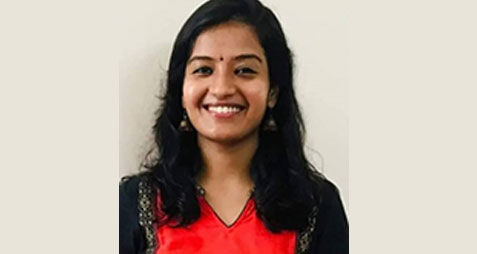
Divya Shakti (Pilani, ’11) is an Officer Trainee at Indian Police Service. She appeared for the UPSC exam for the first time and got selected as an IPS officer in 2019. But, determined to become an IAS officer, she appeared for the second time and scored IAR 58. Below she shares her motivation, and strategy for the exam.
I wanted to join the Indian Administrative Services because I liked the job profile. It is the only way to participate in the public administration in India.
I decided to appear for the exam for the first time in April 2018 and quit my job in June. I took a month’s time to understand what the exam is all about, questions asked, what goes into the preparation, how to read the newspaper, etc. For this, I listened to the toppers talk. I figured out that the candidate’s general awareness is tested the most for which newspaper reading was of utmost importance. Second I noticed was with limited time, focus should be on reading the basic books. I did self-study. I took coaching for my additional subject, i.e. Geography but I tried learning that as well from practical experience.
For prelims, I wrote mock tests and analysed them. I used to attempt a paper and took time analysing it- my mistakes, my strengths, weaknesses. Another thing I learned is that having a calm demeanour helps in performing well in the tricky questions.
For the mains, I focussed on completing the topics, the syllabus, analysis of the previous year questions and practiced writing the answers. If one does not practice writing the answers, then despite knowing a thousand things, he won’t be able to introduce them in the final paper and all that knowledge would be of no use.
The interview is to judge the candidate’s personality. Staying calm, confident and having worldly awareness helps. The candidate’s personality should have gravity, maturity, understanding, which should reflect before the interview panel.
In my first attempt, I scored 79th rank and that year the number of seats for the general category were reduced to 72. In the allocation, I was allotted IPS. There’s a difference between the profiles of an IPS officer and an IAS officer. Because I liked the job profile of being an Indian Administrative Services officer, I decided to give another try to the exam. My preparation strategy was similar to the first one.
Often people think that engrossing in the books for clearing the exam but I don’t agree with this. Reading books is important but burying in them is not. Being active in social circle helps you learn whatever is happening in the world. The candidate should be able to apply his learnings practically in life. For example, while reading a political section and reading the newspaper, you should be able to understand that with regards to the Indian constitution, how it works and how we observe that around us.
When you learn from practical experience, you are able to remember things better. So it has to be a mix of theory and general awareness.
However, if the candidate is serious and really wants to clear the exam, he has to stay away from distractions. This exam is a long process and studying for an exam, which you don’t know whether you’ll be able to clear, or not tends to get boring. So staying away from distractions is what differentiates a serious candidate from a non-serious one. One has to remain consistent. Having a solid and supportive social circle really helps boost the candidate’s morale and confidence.
Working in private sector company at JP Morgan and then in a public sector was very different. My first learning at JP Morgan Chase, was understanding the efficiency and working style of the sector.
Building the team’s confidence and trust and being a good leader I learned from my manager there. My manager there not only maintained his work life balance, but encouraged the same for his teammates too. In the government sector, we have to lead people and make them realise that their work is important.
The lifestyle of the people in the urban setting is different from the lifestyle of the people living in districts. And technology plays a huge role in this. I want to bring technology to small districts or government organisations and uplift their lifestyle as well.
The term success is very personal to every person. My father always says, the day you realise that you have it all, is the day your downfall starts. The day I start learning without being complacent, and staying humble at the same time will be success for me.
Many times candidates are not able to clear the exam in the first attempt, despite trying their hardest. During that time, it is better that they take a short break and analyse their strategy. Many times we put in efforts but in the wrong direction. Analysing what is going wrong, realising the weaknesses and analysing the demand of the exam is critical to succeed in such a coveted exam.
The candidate should not be demotivated because there is a lot of competition, which makes the chances of clearing this exam slim. Not comparing oneself to their peers is very important. Staying confident and consistent is the key to this exam.
It is a three-stage exam. It’s not a sprint but a marathon and for winning the marathon, one has to stay maintain their consistency and speed.
You Might Also Like
- BITS to Baker Hughes: Shad Hussain’s Journey Through Turbulent Times
- Be Cool: Navigating Life, Literature, and Mental Health with Shashi Warrier
- Coaching Across Cultures: Brajesh Bajpai’s Journey of Learning, Leading, and Adapting
- From Engineer to AI Leader: An Interview with Akhil Singhal on Startups, Strategy, and the Future of Gen A
- From Circuits to Capital Markets: Deepak Joshi’s Global Finance Journey














